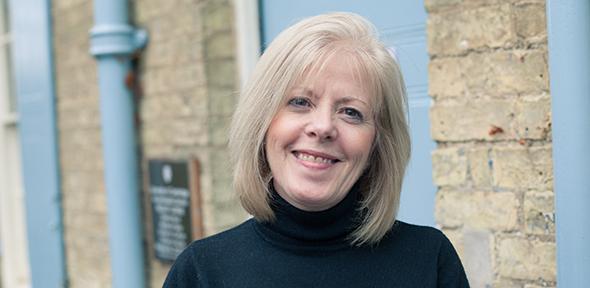
Julie Darsley runs an organisation that helps newcomers settle into life at Cambridge. Her personal experience has given her valuable insight into the challenges they face.
I’ve got two hats. One of my jobs is to act as the administrator of Newcomers and Visiting Scholars (NVS). My other job is to be part of the team at the Accommodation Service. The two roles fit neatly together as both involve helping people to find their feet in Cambridge.
My own experience helps me with both jobs. When I was in my 20s, my husband got a postdoctoral position at the National Institute for Health (NIH) in Maryland, USA. I arrived with a one-year-old knowing no-one but soon met a few others in the same position and together we helped form the International Women’s Group (IWG).
Living overseas made me realise what it’s like to move country. IWG was a lifeline and made our ten years in the USA a really special time. The friends we made became like a family and, more than 25 years later, we’re still in touch. What’s really wonderful is that the group we helped form continues today.
Loneliness can be a real problem for newcomers. People, and they are still predominantly women, have often left established careers to follow their partner to Cambridge and they can really struggle for a while, coming to terms with such a big upheaval. NVS helps make their time here worthwhile and exciting.
We returned to the UK so that my husband could take up a post in Cambridge. I saw an advertisement for an accommodation assistant with a role helping visiting scholars and felt that it was calling my name. I leapt at the chance to help people arriving at Cambridge University to settle into their new lives.
Newcomers and Visiting Scholars started in the 1960s. Originally there were two groups, the Newcomers Group and the Society for Visiting Scholars. We combined them to reach out to everyone new to the university. The emphasis is on social activities and friendship, essentially bringing people together to make connections.
Our participants are university employees or visitors and their spouses or partners. In the early days, the spouses were mainly wives of senior academics. But things have changed and now we’re seeing younger women and more men coming to the group, which is great.
We try really hard to get the message out that NVS exists. I hate to hear that someone has been struggling with making a new life in Cambridge and has never heard of us. Some people come along to one or two sessions until they make friends — others become regulars. We’re happy for people to do whatever suits them.
The programme has developed hugely — thanks to our volunteers. We have 65 of them, almost all women, and together we offer a range of activities. We regularly have as many as 45 people, plus seven volunteers, attending our Tuesday conversation practise classes in the University Centre. There’s a real hunger for the opportunity to talk to native English speakers and share worries about communicating effectively.
I love working with our volunteers. They’ve come up with some great suggestions for events and groups. They include delicious English teas put on by Alice Fleet, and a ‘spade to plate’ group organised by Karina Wells who takes people to her allotment to harvest vegetables and then back to her house to cook them.
The letters we get are testament to the work of the NVS. Just the other day we received a copy of a letter sent to the Vice-Chancellor. It came from one of our French members with six others signing in support. She wrote: ‘Without NVS, our year in Cambridge would have been completely different. Everything is done here to welcome academics and their family.”
I also work for the Accommodation Service. Each year we help 14,000 people find somewhere to live, whether it’s for a few weeks or several years. We have a database of properties, both University and private. We’re also able to offer people advice on finding a school, registering with a GP and we provide general signposting.
I’ve developed a sixth sense about people and places to live. Over the years I’ve helped so many people find places to live that I’m able to match them with properties. Americans, for example, like light and head space. It’s really satisfying when someone says: you’re right, this neighbourhood suits me perfectly.
Securing school places these days can be a real headache. Newcomers often assume that they will automatically get places for their children at the nearest school. But the pressure on places is so great that this often isn’t the case, even when they are living well within the catchment area. Again, I’m able to help them find the best solution.
I’ve been working here for 17 years. I now get emails saying: hello Julie, are you still there? The answer is yes and I still love my job. In fact, I’ve got lots of ideas of how we could make things better and more joined-up — something that shows I haven’t lost a jot of the enthusiasm I had when I started.
This profile is part of our This Cambridge Life series.
